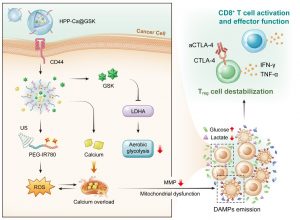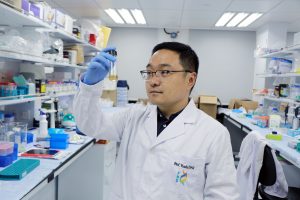A research team led by Dai Yunlu, associate professor in the Faculty of Health Sciences (FHS) at the University of Macau (UM), has made significant progress in cancer immunotherapy. The study fabricates a new metal-polyphenol nanomedicine to regulate cancer cell metabolism using ultrasound-mediated oxidative stress and aerobic glycolysis suppression. The ‘sono-metabolic’ treatment helps reprogramme the tumour microenvironment, thereby improving T-cell antitumour efficacy. The research results have been published in the international journal ACS Nano.
Cellular metabolism is crucial for maintaining the viability and function of cancer cells and immune cells. A hallmark property of malignancy is that, even under well-oxygenated conditions, cancer cells break down glucose to produce lactic acid by glycolysis, a phenomenon known as ‘aerobic glycolysis’. The study found that cancer cells with high metabolic activity outcompete immune cells for limited nutrients available in the surrounding environment. High glucose uptake and lactate production by cancer cells not only deprive CD8+ T cells of their energy source and impair their effector functions, but also support the immunosuppressive activity of regulatory T (Treg) cells.
In light of this, the research team developed a novel metal-phenolic nanomedicine, HPP-Ca@GSK, to perform efficient cancer cellular mitochondrial dysfunction and tumour microenvironment reprogramming via sono-metabolic treatment. Specifically, the team introduced the GSK2837808A (GSK, LDHA inhibitor) to suppress glycolytic metabolism in cancer cells and recreates a high-glucose, low-lactate tumour microenvironment, which is conducive to CD8+ tumour-infiltrating T lymphocyte effector function and Treg cell destabilisation. In addition, ultrasound-mediated oxidative stress induces intracellular calcium overload, which triggers the mitochondrial disorder for highly efficient damage-associated molecular patterns exposure. This assists dendritic cell maturation and CD8+ T cell activation, enabling more tumour infiltration of effective CD8+ T cells. Finally, the assistance of aCTLA-4 antibodies further induces the phenotypic instability of Treg cells and amplifies the sono-metabolic therapeutic influence.
Prof Dai and Li Bei, research assistant professor in the FHS, are the corresponding authors of the study. PhD student Yan Jie, research assistant Li Wenxi, and PhD student Tian Hao in the FHS are the co-first authors. PhD student Yu Xinying, PhD graduates Wang Guohao and Sang Wei made important contributions to the study. The Proteomics, Metabolomics and Drug Development Core, Animal Research Core, and Biological Imaging and Stem Cell Core of the FHS also provided support for the research. The research project was supported by the National Natural Science Foundation of China (File no: 32222090, 32171318, and 32101069), UM (File no: MYRG2022-00011-FHS), the Science and Technology Development Fund of the Macao SAR (File no: 0103/2021/A and 0133/2022/A3), the Shenzhen-Hong Kong-Macao Technology Research Programme (Type C) (File no: SGDX20201103093600004), Dr. Stanley Ho Medical Development Foundation (File no: SHMDF-OIRFS/2022/002) and the Ministry of Education Frontiers Science Center for Precision Oncology, University of Macau (File no: SP2023-00001-FSCPO). The full version of the research article is available at https://pubs.acs.org/doi/full/10.1021/acsnano.3c02428.
| Source: Faculty of Health Sciences | |
| Media Contact Information: | |
| Communications Office, University of Macau | |
| Albee Lei | Tel: (853) 8822 8004 |
| Cravina Chong | Tel: (853) 8822 4323 |
| Email: | prs.media@um.edu.mo |


